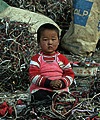Greenpeace guide to greener electronics
Here are the scores:
- 7.3 – Nokia — Remains in first place with good scores on toxics use reduction, but loses points on energy.
- 6.9 – Sony Ericsson — Moves up with top marks on toxics elimination but weak on recycling.
- 5.3 – Toshiba — Good score on toxics elimination but needs to meet upcoming phase out commitment by March 2010.
- 5.3 – Philips — Loses points for failing to lobby for phase out of hazardous substance in legislation.
- 5.1 – Apple — Continues to improve, scoring best on eliminating toxic chemicals and e-waste criteria.
- 5.1 – LG Electronics — LG score improves, but is still penalized for postponing date for toxics phase out.
- 5.1 – Sony — Maintains overall score with better energy total, but needs to lobby for stronger chemicals legislation.
- 5.1 – Motorola — Slightly reduced score, due to lack of lobbying for stronger chemicals legislation.
- 5.1 – Samsung — Big drop due to penalty point for failing to meet commitment to phase out hazardous substances.
- 4.9 – Panasonic — Score unchanged, strongest on energy but poor on e-waste and recycling.
- 4.7 – HP — Improved position thanks to clear support for global emissions reductions, but needs to lobby for improved chemical legislation.
- 4.5 – Acer — Score unchanged but Acer is lobbying for stronger chemicals legislation.
- 4.5 – Sharp — Loses points due to poor information on toxics elimination and fails to support stronger chemicals legislation.
- 3.9 – Dell — Reduced score on energy criteria and penalty point for delaying toxics phase out till 2011.
- 3.5 – Fujitsu — Improved score due to support for global carbon emission reductions and cutting its own emissions.
- 2.5 – Lenovo — Score unchanged, with penalty point for indefinite delay on toxics phase out.
- 2.4 – Microsoft — Reduced score, fails to support strong chemicals legislation.
- 1.4 – Nintendo — Nintendo remains in last place with the same score.
Interestingly, Samsung (disclosure: Experientia client) actually dropped substantially, compared with the previous three ratings (September 2009, July 2009 and March 2009), and this despite Samsung’s “Eco-Management 2013†plan (see also here) that establishes a set of goals to make Samsung a leading eco-friendly company by 2013. The plan aims to develop new, environmentally friendly products while also reducing greenhouse gas emissions in their production.
Greenpeace’s argumentation:
Samsung drops down the ranking from 2nd place to joint 7th (tied with Sony and Motorola), as a result of a penalty point imposed for backtracking on its commitment to eliminate brominated flame retardants (BFRs) in new models of all products by January 2010 and PVC by end of 2010. Its new timeline for removing BFRs and PVC in new models of notebooks is 1 January 2011 but there is now no time line for removing these substances in TVs and household appliances. It also loses points for failing to show support for improvements to the revised EU RoHS Directive (Restriction of Hazardous Substances in electronics); specifically, a methodology for further restrictions of hazardous substances, and an immediate ban on BFRs, chlorinated flame retardants (CFRs) and PVC vinyl plastic.
Samsung apparently still has some work to to, but working with the company recently, we know that they can be incredibly quick. So we wouldn’t be surprised to see them move to the top three again in the next survey.




